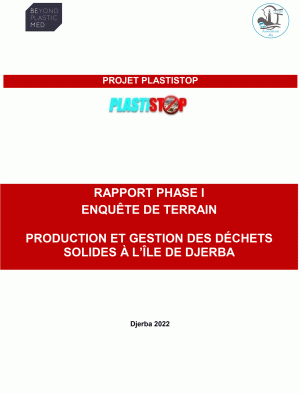
This report presents the results of a field survey on plastic waste on the island of Djerba, conducted between April 2021 and November 2021, among the main players involved in the management of this waste, ranging from producers, to collectors, to collection services, to municipalities. The survey will be both qualitative and quantitative, and will involve face-to-face interviews with waste stakeholders.
The main objective of this field survey is to gather information on the sources and quantities of plastic waste on the island of Djerba, and to obtain a complete idea of the state of awareness of waste producers about pollution. The survey was aimed primarily at waste producers (households, shops, hotels, cafés and restaurants, fishing and yachting), but also at people and institutions involved in waste management, such as waste service managers, district managers, formal and informal collectors and civil society players active in the environmental field on the island of Djerba.
The target population for this survey was divided into 10 sectors covering (1) economic players whose activity generates plastic waste: actors in the trade activity, actors in the fishing activity, actors in the tourism activity, actors in the catering activity; (2) municipalities and representatives of the Ministry of the Environment; (3) stakeholders in the plastic waste sector such as formal and informal collectors and (4) civil society actors who are active in the environmental field on the island of Djerba.
The results of this survey were used to plan pilot actions to reduce plastic waste pollution on the island of Djerba, and to identify the factors favoring the acceptability or abandonment of the various solutions. Quantifiable data from the survey have been mapped, and the resulting maps will serve as a basis for communication with key players, namely municipalities and representatives of the Ministry of the Environment (ANGed, APAL, ANPE), with a view to improving their municipal services. Ultimately, the results of this survey will provide food for thought and recommendations that will be shared with actors, stakeholders and decision-makers in order to improve the waste management system and promote its recovery.